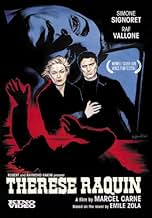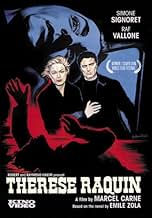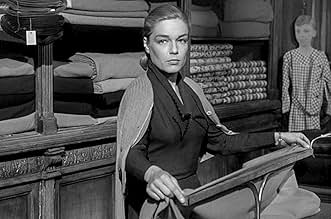Thérèse Raquin
- 1953
- Tous publics
- 1h 42min
NOTE IMDb
7,4/10
2 k
MA NOTE
Un chauffeur de camion tue le mari de la femme qu'il aime et devient l'objet de chantage.Un chauffeur de camion tue le mari de la femme qu'il aime et devient l'objet de chantage.Un chauffeur de camion tue le mari de la femme qu'il aime et devient l'objet de chantage.
- Réalisation
- Scénario
- Casting principal
- Récompenses
- 2 victoires et 2 nominations au total
Martial Rèbe
- Grivet
- (as Martial Rebe)
Francette Vernillat
- Françoise, la bossue
- (as Françoise Vernillat)
Madeleine Barbulée
- Madame Noblet, une cliente
- (as Madeleine Barbulé)
Avis à la une
Emile Zola wrote page turners. He focused on the injustices of the great unwashed of France, from miners to prostitutes. His books were incredibly naturalistic and moralistic. His characters seldom came through unscathed but made a statement about the cultural milieu of the time. This is a story about passion. Therese Raquin is the wife of a tiresome mama's boy hypochondriac. She is beautiful and is married to this childish wimp. Along comes the handsome truck driver after she has spent six empty years with this guy. They have tryst and even let the husband know that he is going to lose his wife. Everything changes when, on a train trip to Paris, fate takes over. Granted, there are lots of plot contrivances, but that's the literary style of the period. Also, in the naturalist tradition, the characters often lose control of their destinies. There is a broader moral sense that trumps the likable ending that people are used to in movies made at this time. The writer and the director can't turn their backs on issues like these and so life goes on and the impulsive and evil are punished alike.
I'll have to disagree with some of the more negative comments about this film. Marcel Carne has succeeded beautifully in capturing the mood and major themes of Zola's novel in THERESE RAQUIN. It's nice to see a film from the period dealing with common working class people caught up in the turmoil of love and everyday life. The main romantic leads initially seem a little mismatched but by film's end the ice has more than melted between them. How many times have we seen the female lead fall too quickly for her suitor. Here it takes its sweet time and plays the better for it. Signoret's titular character seems almost a bit too stoic but considering her numbingly bland and lenghty marital situation, it may well be authentic. As many women are in reality, Therese is fiercely loyal to her husband, whether he deserves it or not. The ruggedly handsome Raf Vallone is ideally cast as the trucker who steals her attention and makes a good contrast to her dishrag of a husband. A blackmailing sailor who appears in the middle of the film before making a menacing reappearance near the end is very effectively played by Rolland leSaffre. He is as creepy as Robert Mitchum in CAPE FEAR. Do seek this one out and enjoy the ride!
Not the best of Marcel Carne by any means but an intelligent, measured if somewhat conventional screen version of Zola's novel, nevertheless. Simone Signoret is "Therese Raquin", the married woman whose affair with truck-driver Raf Vallone leads to murder and blackmail. She is, of course, excellent but this is Vallone's movie; it is an effortless performance of an ordinary man caught up in events over which he has no real control. It's also superbly shot in Lyon by Roger Hubert and the updating to postwar France fits the plot perfectly. In an American setting this could be by James M. Cain though the climatic twist is neater than anything Cain might have given us.
Thérèse Raquin (AKA: The Adultress) is directed by Marcel Carné and Carné co-adapts the screenplay with Charles Spaak from the Émile Zola novel. It stars Simone Signoret, Raf Vallone, Jacques Duby, Maria Pia Casilio and Roland Lesaffre. Music is by Maurice Thiriet and cinematography by Roger Hubert.
Carné reworks Zola's novel to be set in post-war Lyon and slips into a film noir gear. Plot essentially finds Signoret as Raquin, a severely repressed woman stuck in a marriage to her wimpy weasel of a cousin, not only that but she also has to share a home with his domineering mother. Then one day the strapping Laurent LeClaire (Vallone) enters her life, sparking a fiery affair, but as plans for the future are plotted, a turn of events drastically changes everything.
The characterisations are strongly performed, the five principals (Lesaffre arrives late in the play as a key character) giving performances that really draw you into their respective worlds, for better or worse as regards the human condition. Carné skillfully blends the beautiful side of Lyon, such as the quaint cobbled streets and the River Rhone, with a dull bleakness that fogs Thérèse, a woman who has forgotten how to smile, sexual fulfilment a non entity. Hubert also brings his photographic skills to the show, providing some blisteringly gorgeous night shots that offer hope for the new found lovers. But there is a sign post up ahead and it says that the next stop is noirville, and after having spent half the film building his characters, Carné dashes hope and replaces it with misery. Fate plays a big part in the crux aspects of the film, a film noir staple of course, right up to the clinical finale that comes with a thunderous fait accompli.
It's a bit draggy in parts as the director is at pains to show the humdrum side of life, but the change of gear at the mid-point - and the brilliant last quarter, make this a worthy addition for collectors of Frenchie noir. 8/10
Carné reworks Zola's novel to be set in post-war Lyon and slips into a film noir gear. Plot essentially finds Signoret as Raquin, a severely repressed woman stuck in a marriage to her wimpy weasel of a cousin, not only that but she also has to share a home with his domineering mother. Then one day the strapping Laurent LeClaire (Vallone) enters her life, sparking a fiery affair, but as plans for the future are plotted, a turn of events drastically changes everything.
The characterisations are strongly performed, the five principals (Lesaffre arrives late in the play as a key character) giving performances that really draw you into their respective worlds, for better or worse as regards the human condition. Carné skillfully blends the beautiful side of Lyon, such as the quaint cobbled streets and the River Rhone, with a dull bleakness that fogs Thérèse, a woman who has forgotten how to smile, sexual fulfilment a non entity. Hubert also brings his photographic skills to the show, providing some blisteringly gorgeous night shots that offer hope for the new found lovers. But there is a sign post up ahead and it says that the next stop is noirville, and after having spent half the film building his characters, Carné dashes hope and replaces it with misery. Fate plays a big part in the crux aspects of the film, a film noir staple of course, right up to the clinical finale that comes with a thunderous fait accompli.
It's a bit draggy in parts as the director is at pains to show the humdrum side of life, but the change of gear at the mid-point - and the brilliant last quarter, make this a worthy addition for collectors of Frenchie noir. 8/10
A riveting modernization of the eponymous Emile Zola novel, THÉRÈSE RAQUIN chronicles the adulterous infatuation between a burly truck-driver and the beautiful, badgered wife of his feeble colleague that results in murder, blackmail and psychological-damnation. Marcel Carné deftly taps into the mechanics of American film-noir of the 1940s with conspicuous blending of plots of two celebrated James M. Cain classics: "DOUBLE INDEMNITY" & "THE POSTMAN ALWAYS RINGS TWICE" and skilfully harmonizes it with the drab and monotonous lifestyle of the French bourgeoisie. There are subtle nods to Hitchcock's "BLACKMAIL" and uncanny parallels with Park Chan-Wook's "THIRST" (which in retrospect make perfect sense as Park also borrowed significantly from the Zola novel.)
Simone Signoret is phenomenal as the titular lead and her transformation from a browbeaten wife trapped in a loveless marriage to a sympathetic femme-fatale is adroitly handled. Her restrained turn might seem too stoic at first but she exudes volumes through her apathetic veneer. Raf Vallone (reminiscent of a brooding Burt Lancaster) is convincing as the impulsive truck driver who's determined on unshackling Thérèse from her oppressive, wretched existence. Roland Lesaffre's addition as the greasy, opportunistic sailor further strengthens the elements of suspense in the story. The naturalistic B+W photography is excellent and maintains a healthy balance between carefully choreographed claustrophobic scenarios and exquisite exterior compositions.
Thérèse Raquin represents French film-making of the old school where storytelling was paramount and is recommended to connoisseurs of classic film-noir
Simone Signoret is phenomenal as the titular lead and her transformation from a browbeaten wife trapped in a loveless marriage to a sympathetic femme-fatale is adroitly handled. Her restrained turn might seem too stoic at first but she exudes volumes through her apathetic veneer. Raf Vallone (reminiscent of a brooding Burt Lancaster) is convincing as the impulsive truck driver who's determined on unshackling Thérèse from her oppressive, wretched existence. Roland Lesaffre's addition as the greasy, opportunistic sailor further strengthens the elements of suspense in the story. The naturalistic B+W photography is excellent and maintains a healthy balance between carefully choreographed claustrophobic scenarios and exquisite exterior compositions.
Thérèse Raquin represents French film-making of the old school where storytelling was paramount and is recommended to connoisseurs of classic film-noir
Le saviez-vous
- AnecdotesRaf Vallone refused to be dubbed in the French version and had his contract amended accordingly. The scenario was also slightly changed to "Italianize" the character of Laurent.
- ConnexionsFeatured in Mémoires pour Simone (1986)
Meilleurs choix
Connectez-vous pour évaluer et suivre la liste de favoris afin de recevoir des recommandations personnalisées
- How long is The Adultress?Alimenté par Alexa
Détails
- Date de sortie
- Pays d’origine
- Langue
- Aussi connu sous le nom de
- The Adultress
- Lieux de tournage
- Sociétés de production
- Voir plus de crédits d'entreprise sur IMDbPro
- Durée
- 1h 42min(102 min)
- Couleur
- Rapport de forme
- 1.37 : 1
Contribuer à cette page
Suggérer une modification ou ajouter du contenu manquant















